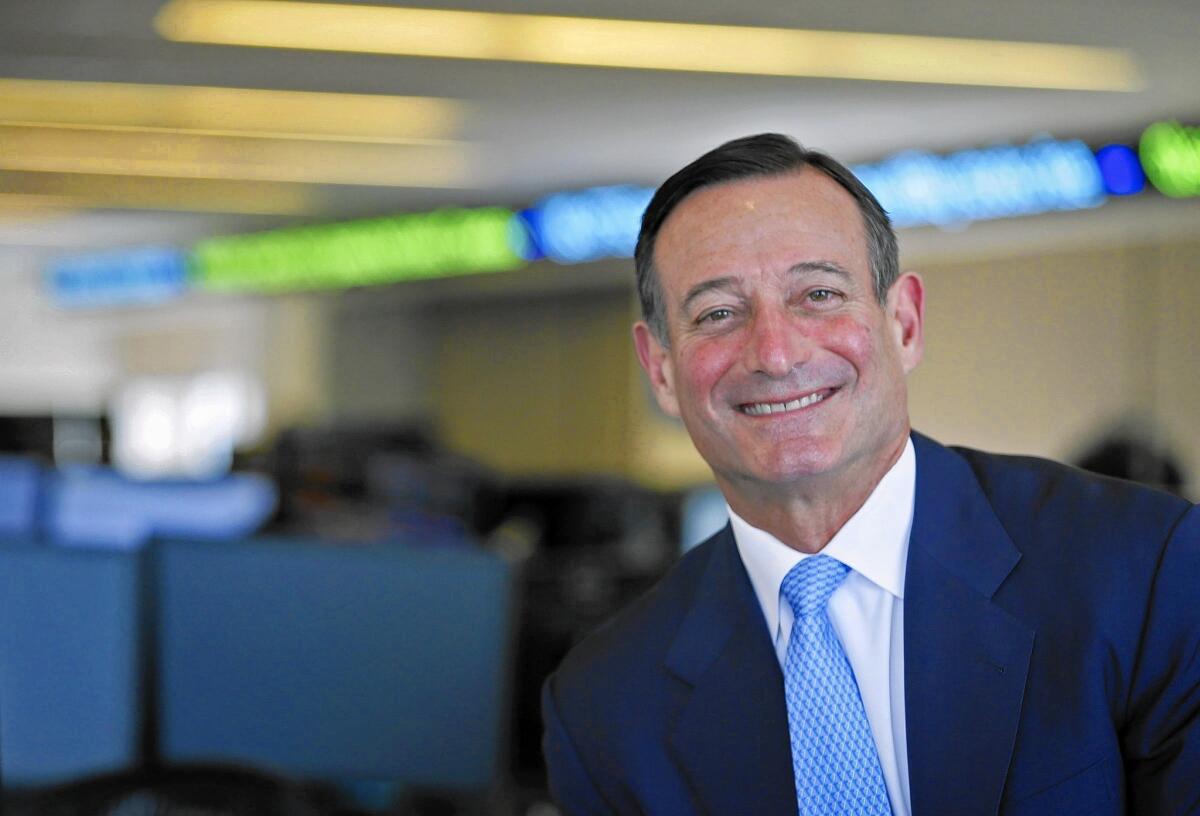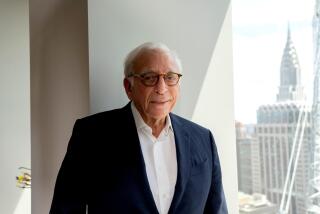Can Pimco’s quiet point man shine in public?

Battling poor returns and management turmoil early last year, Pacific Investment Management Co. posted a promotional video on its website to reassure nervous investors.
Co-founder and celebrated bond manager Bill Gross, a ubiquitous presence on financial TV channels, was flanked by new faces, including a little-known insider recently elevated to chief executive, Douglas M. Hodge.
Gross, with a larger-than-life persona, emphasized that he would return to focusing solely on reviving investment returns. Hodge, he said, would handle the client duties and be the public face for the company — “Mr. Outside,” Gross called him.
------------
FOR THE RECORD:
Pimco CEO: In the April 26 Business section, an article about the new chief executive of Pacific Investment Management Co. said that a key fund managed by Pimco co-founder Bill Gross that had performed poorly in 2011 “continued to falter” in 2014. The Total Return Fund outperformed peers and a benchmark in 2012, beat a benchmark but underperformed peers in 2013, and faltered by both measures in 2014.
------------
Today, much has changed at Pimco. The video has been taken down, Gross is gone, and the Newport Beach company teeters on its perch atop the multitrillion-dollar bond mutual fund business.
And Wall Street is watching to see if the new chief executive can turn around Pimco’s flagging fortunes.
Since the abrupt departure of Gross near the end of September, Hodge and his colleagues have struggled to contain a hemorrhage of investor withdrawals that have topped $100 billion, and counting, from its flagship Total Return Fund alone.
Investments in the once-vaunted account, a must-have in retirement portfolios until recently, have fallen about 60% from the peak of $292.9 billion in 2013. It was the world’s largest bond mutual fund for years — until last month.
That’s why the role of Hodge as Mr. Outside is more crucial to Pimco’s future than ever.
In the face of internal upheaval and investor panic, Hodge has won high marks for shifting Pimco from a star system to a team-oriented approach and for traveling ceaselessly to reassure jittery investors.
Like many investment firms, Pimco is split primarily into an investment operation that oversees and manages clients’ money and a business side, which Hodge now heads, that attracts and manages the clients and runs the rest of the company.
Pimco’s investment unit, hurt by Gross’ misfire on interest rates yet devastated by his departure, has performed well during the internal crisis — handily beating benchmarks in the face of gushing outflows.
But there’s a growing impatience within the company for Hodge to break out on the business side and carry the company’s banner forcefully in public, people familiar with the company said.
Hodge hasn’t appeared on financial news shows since widely panned interviews shortly after Gross left, they said. Nor has he played the same high-profile role as his peers — such as Laurence D. Fink, chief executive of giant asset manager BlackRock Inc., who regularly speaks at industry gatherings or in public policy forums.
“That creates a huge vacuum that has to be filled,” said one of those familiar with the company. The question, the people said, was whether a longtime deputy behind the scenes can make the transition to chief executive.
In an interview, Hodge said his personal achievements aren’t important. He pointed to the influx of new talent, the outperformance of Pimco’s flagship funds and the slowing rate of investor outflows as proof that the firm is on the right track.
“It’s really about the depth of the team and the process that’s been part of Pimco for so long. That’s what I’m most proud of,” he said. “I’m not the guy who stands in the klieg lights and says it’s all about me. That’s not what I’m about.”
He has plenty of supporters. William J. Popejoy, a longtime Pimco trustee until last summer, said Hodge “has been tested many times” and is the right leader to shift Pimco from a one-man show to a more stable model.
“He’s probably what the doctor ordered right now,” Popejoy said.
Whether Hodge can fill the void left by Pimco’s departed stars, Popejoy said: “Time will tell. He’s going to be a good face of the company. He’s not going to be the whole picture.”
The son of an IBM mainframe salesman and a real estate broker, Hodge grew up in suburban Boston and Connecticut and went to Dartmouth and Harvard Business School.
After going to work as a bond trader at the then-highflying Salomon Bros.
investment firm, Hodge remembered advice he got in business school to pursue a job that “plays to your strengths.”
In 1989, he joined Pimco on the business side. Hodge found a niche as an account executive, known for his fluency in explaining the company and its products to clients.
He started out as a one-man international sales operation, cold-calling hidebound foreign pension and sovereign funds to persuade them to move their money outside their home markets to a relatively unknown Southern California firm.
“People had never heard of us,” Hodge said.
In 2002, he moved to Tokyo to take over the Asia-Pacific region. The timing was good: Allianz, the German insurance giant and majority owner of Pimco, was backing a global expansion. Hodge helped increase foreign-based investments to 30% of Pimco’s assets.
Meanwhile, a sharp drop in interest rates after the dot-com bust and short recession in 2001 had triggered a bull market in bonds — Pimco’s specialty.
During the 2008 financial crisis, Hodge helped organize a daily 5 a.m. meeting with division heads to coordinate the firm’s message to anxious clients.
That helped keep investors in the fold as the investment side deftly pulled back on mortgage debt, leaving Pimco stronger than ever in the aftermath.
The next year, Mohamed El-Erian, then the CEO and Gross’ equal on the TV circuit, called Hodge back from Asia to take over as chief operating officer to plot post-crisis strategy. “You’re the person I trust,” El-Erian said, according to Hodge.
The plan: Expand.
Hodge helped roll out new funds in esoteric areas such as junk bonds, private equity debt and even stocks. With Gross and El-Erian serving as the public faces of the company on financial network CNBC and elsewhere, the name “Pimco” became synonymous with the roaring bond market.
Total assets under management zoomed past $1 trillion in 2009. A little over two years later, it had doubled again.
The unraveling that led to Gross’ fall and Hodge’s rise began in 2011 after Gross bet against U.S. Treasuries in the mistaken belief that interest rates would soon rise. The performance of
Total Return, according to research firm Morningstar Inc., slumped 3 percentage points below the industry benchmark, a huge drop in the bond world.
After peaking at $292.9 billion two years ago, Total Return began to leak investors as its gains fell below the benchmark again that year.
Tensions between Gross and El-Erian simmered at the time over investment styles and what many viewed as Gross’ mercurial and abusive treatment of others in the cloistered trading room.
Hodge deftly mediated between the two, Popejoy said, while providing candid assessments of the escalating problem to the trustees of Total Return and other funds. Among other things, Hodge suggested shifting marketing focus to other fund managers, including Daniel Ivascyn, a rising star who also was popular in the trading room.
“He was pretty clear that all wasn’t well in paradise,” Popejoy said.
In January 2014, El-Erian quit, touching off a rolling crisis as details of the internal dissatisfaction with Gross spilled into public view and a parade of investment professionals resigned — one to start a food truck — or threatened to quit.
As friction grew and morale worsened, Gross’ position became increasingly untenable as Total Return’s performance continued to falter, and senior executives turned against him, prompting Gross’ sudden resignation.
The post-Gross period has been an exercise in damage control.
Pimco moved quickly to bolster investor confidence, but in a public appearance, Hodge came across as programmed and wooden.
“This firm is moving forward,” he repeated with some variation to CNBC-TV on Sept. 30. “We are enthusiastic. We are optimistic. Our clients are standing with us. This firm is on the move, and we are ready to go.”
Pimco made a flurry of new hires, including White House advisor Gene Sperling and economist Joachim Fels, and rehired Nobel laureate Michael Spence and well-regarded manager Marc Seidner, both of whom had left in the wake of El-Erian’s departure.
Competitors snipe that Hodge, despite the hiring spree for the investment side, has yet to demonstrate that he has the stature inside and outside the company to make the firm’s new team-oriented approach work.
“You don’t have a team unless people have a mutual regard and respect for each other’s expertise,” said an executive at a rival firm who asked to remain anonymous. “There’s sometimes a conflation between having bodies and having a functioning group. It’s not the same thing.”
Investors, meanwhile, remain skeptical.
“It’s going to be a long time before they’re back in serious consideration to be in our portfolio again,” said Owen Murray, investment director at an advisory firm for wealthy individuals in Houston. He pulled his clients’ money, $12.2 million, after Gross left, citing excessive “drama” at the firm.
Executives at Pimco’s parent, Allianz, are looking to the midsummer for outflows to turn around, said Michael Huttner, a London analyst for JPMorgan Chase & Co. A person close to Pimco said the firm expects the outflows to continue to moderate, not necessarily reverse, in coming months. A spokeswoman for Allianz declined to comment.
Analysts for the most part have applauded Pimco’s moves after Gross’ departure. Ivascyn and Pimco’s investment team also have restored the performance of Total Return, pushing it nearly a full percentage point above the benchmark in the last six months.
JPMorgan’s Huttner said the immediate challenge for Hodge and Pimco’s top management is trying to replace Gross’ Pied Piper-like ability to engage the broader public and bring in new investors.
Whether Hodge can fill that void, Huttner said, “we’ll have to see.”







